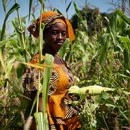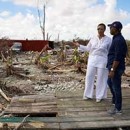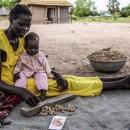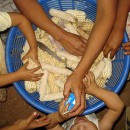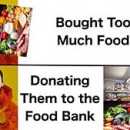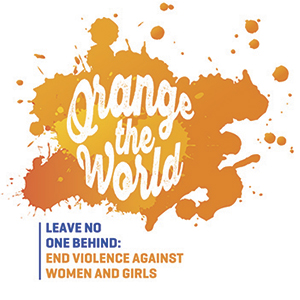Friday, June 9, 2023
News and Views from the Global South
Gender Violence
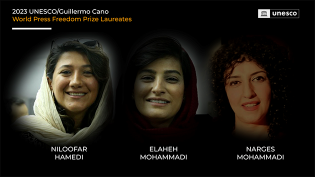
Three Imprisoned Iranian Women Journalists Awarded 2023 UNESCO/Guillermo Cano World Press Freedom Prize
Niloofar Hamedi, Elaheh Mohammadi and Narges Mohammadi have been named as the laureates of the 2023 UNESCO/Guillermo Cano World Press Freedom Prize, following the recommendation of an International Jury of media professionals. The awards ceremony took place on the evening of May 2 in New York, in the presence of Audrey Azoulay, Director General of UNESCO.
A Caribbean Writer Fights Gender-Based Violence with Lit, Protests
For the past six years, Jamaican writer and scholar Opal Palmer Adisa has been one of the voices crying out against the prevalence of gender-based violence in the Caribbean and elsewhere. To highlight this human rights issue, she launched “Thursdays in Black” - holding public protests throughout the year and, on Thursdays, making use of social media to spread her message and raise awareness.
International Women’s Day, 2023
From the earliest days of computing to the present age of virtual reality and artificial intelligence… …women have made untold contributions to the digital world in which we increasingly live.
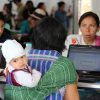
Digital Gender Gap in Latin America Reflects Discrimination Against Women
The digital gender gap is multifactorial in Latin America and as long as countries fail to address discrimination against women, inequality will be reflected in the digital space, excluding them from access to opportunities and enjoyment of their rights.
Gender Central to Parliamentarians’ Programme of Action
The post-COVID-19 period has been a crucial one for members of parliament who have their work cut out to ensure that issues that arose during the pandemic are addressed, especially concerning the ICPD25 commitments and programmes of action for universal access to sexual and reproductive rights, gender-based violence and building peaceful, just and inclusive societies. Across the world, progress toward achieving the SDGs by 2030 was impacted during the pandemic.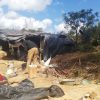
In Zimbabwe, Economic Crisis Pushes Underaged Girls to Sex Work
After other adolescent girls her age have gone to bed at around 10 pm, Kudzai commutes to a shopping centre near her home in Penhalonga, a mining area 25 kilometres outside the third largest Zimbabwean city of Mutare, to look for men to solicit sex.
Venezuela: The End of Civil Society as We Know It?
In late January, the UN High Commissioner for Human Rights, Volker Türk, finished an official visit to Venezuela. He said he’d found a fragmented society in great need of bridging its divides and encouraged the government to take the lead in listening to civil society concerns and responding to victims of rights violations.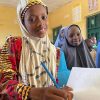
On International Day of Education, We Must Prioritize Girls in Humanitarian Crisis
“Is it a sin to be a girl? We don’t want to be at home and illiterate. We want to go to school, study and be intelligent.” In just a few words, this plea for education from a young Afghan girl has captured the world’s attention. Her heartbreaking question shows how the Taliban’s recent ban on girls attending secondary school and university – effectively ending education opportunities for all Afghan girls and women – is not only violating their fundamental human right to education but shattering countless hopes and dreams in an instant. [related_articles]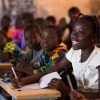
Delivering On Our Promise of Universal Education
As we mark the International Day of Education, world leaders must make good on their promise of providing quality education for all by 2030. Education is our investment in peace where there is war, our investment in equality where there is injustice, our investment in prosperity where there is poverty.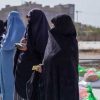
Taking Humanitarianism Hostage – the Case of Afghanistan & Multilateral Organisations
Can you imagine what it would be like if women were simply not allowed to step outside of their homes, let alone to work for a living? When women choose to do so, and they can afford it, then it is a matter of choice. When women mostly cannot, as is the case in Afghanistan now, not only is half the population imprisoned, but children go hungry, and communities sink deeper into poverty.
Women Commuters Travel Safe in Innovative Bus Scheme in Pakistan
A bus rapid transport (BRT) system in Peshawar is benefiting female students and working women by providing a safe journey – something women passengers could not take for granted on regular public transport.
The Trap: A Journey from Afghanistan to Europe
Maliha looks confident in a café in Athens as she tells the story of her journey from Afghanistan to Europe. But as she starts recounting how a smuggler assaulted her in Turkey two years ago, she pauses, looking the other way and fiddling with her loose hair.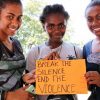
Three Ways to End Gender-based Violence
How are the multiple shocks and crises the world is facing changing how we respond to gender-based violence? Almost three years after the COVID-19 pandemic triggered high levels of violence against women and girls, the recent Sexual Violence Research Initiative Forum 2022 (SVRI) shed some light on the best ways forward.
Push Forward – Act Now to End Violence Against Women and Girls
Five years ago, the global #MeToo movement brought new urgency and visibility to the extent of violence against women and girls. Millions of survivors came forward to share their experience. They forced the world to recognise a reality that shames every one of us. Their courage and voice led to a powerful collective activism and a sea-change in awareness.
End Violence Against Women and Girls
As we now have entered the 21st century, we must end violence against girls and women. Attacking and abusing girls and women as a means of warfare, the war-machinery or domestic violence as a result of crisis, is absolutely abhorrent and unacceptable. Exposing half of the world’s population to the risks of violence because of their gender is not only a violation of international and domestic laws, but a disgraceful and brute breach of our very own humanity.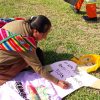
Pandemic Aggravated Violence against Women in Latin America
Violence against women has failed to decline in the Latin American region after the sharp rise recorded during the COVID-19 pandemic, while preventing the causes of such violence remains a major challenge.
Ending Violence against Women: from Rhetoric to Action
Violence against women is a global crisis, prevalent in every community and society around the world. Globally, estimates published by WHO indicate that about 1 in 3 (30%) of women worldwide have been subjected to either physical and/or sexual intimate partner violence or non-partner sexual violence in their lifetime. Yet, there is limited coordination and insufficient funding to truly address the scale of the issue.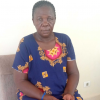
Ugandan Women Tackle Domestic Violence with Green Solutions
Constance Okollet Achom, a Ugandan woman from Tororo, a rural village located in Eastern Uganda, has helped several dozens of her peers affected by domestic violence to address the issue by equipping victims with skillsets to manufacture eco-friendly biofuels from agro-forestry waste.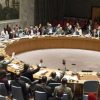
US to Fight Sexual Abuse in International Organizations
The United States, which recently laid down a set of guidelines to monitor sexual exploitation and abuse (SEA) by US citizens in international organizations, including the United Nations and its agencies worldwide, has implicitly accused the UN of faltering on a high-profile case last month.
Ending Gender-Based Violence in a World of 8 Billion
Whether to have children or not is one of the most life-altering decisions a person can make. But as UNFPA’s 2022 State of World Population report shows, people around the world – especially women and members of marginalized groups – are frequently denied any choice in the matter, with partners, relatives, health care providers and even governments making or strongly influencing these decisions.
Three Truths to Address Sexual Exploitation, Abuse & Harassment in the UN
The U.S. Government has recently published 'Engagement Principles' on Protection from Sexual Exploitation Abuse & Sexual Harassment within International Organizations', and while any involvement from Member States is to be encouraged, these principles do not address the fundamental need for either deterrence or for accountability.Next Page »

